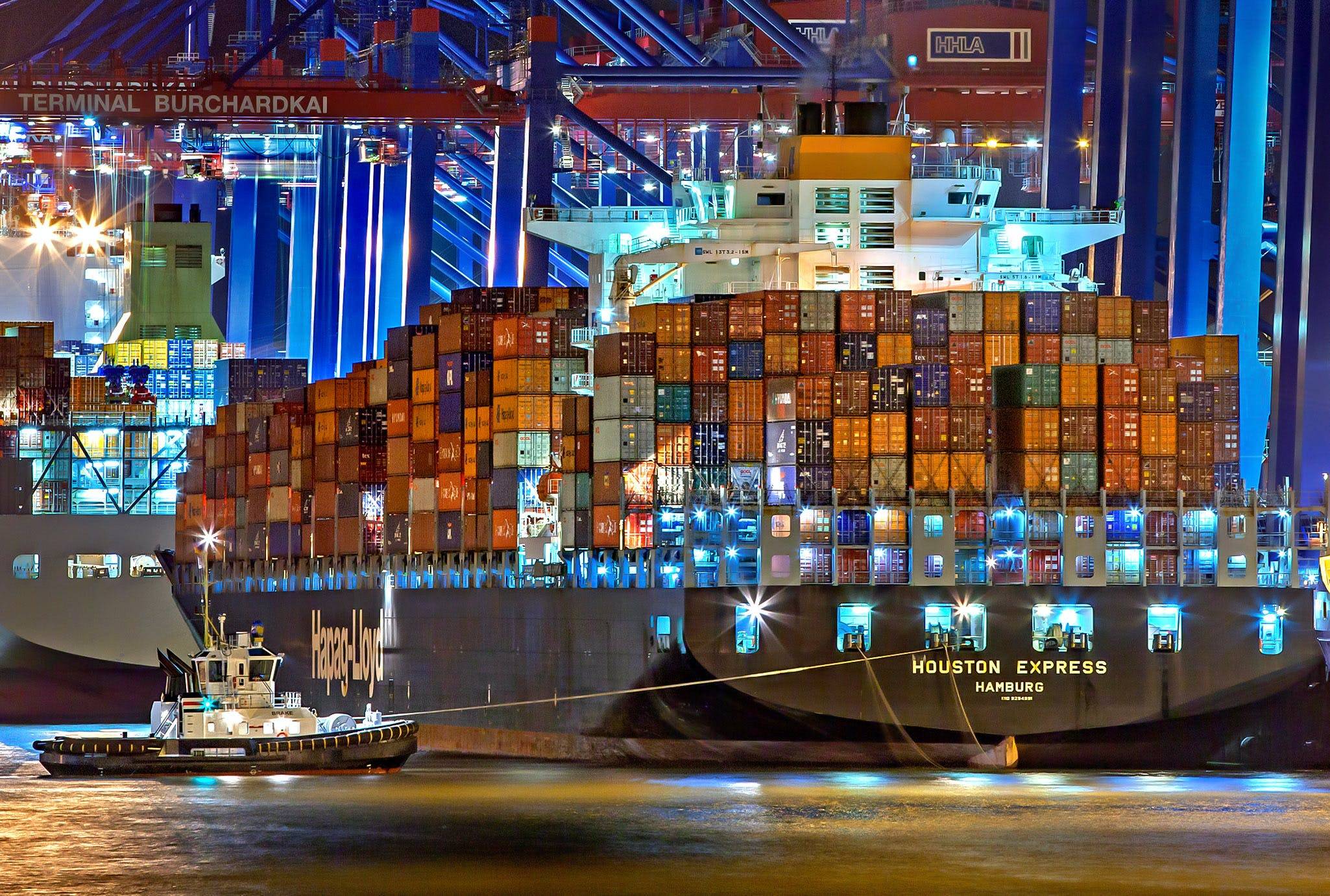How the U.S. Port Strike Could Cripple the US Economy & Distrupt Global Trade
A U.S. port strike threatens to cripple the American economy, disrupt global trade, and cause long-lasting ripple effects worldwide. Discover the potential consequences in this analysis.
The U.S. economy is heavily reliant on its port system for the smooth flow of goods domestically and internationally. A major strike at these critical nodes of commerce could cause significant disruptions, not only affecting the U.S. but also sending ripples throughout the global economy. This article delves into the potential impacts of a port strike in the U.S., examining both immediate and long-term effects on the national economy and global trade.
The U.S. Port System: A Pillar of Commerce
Ports in the United States handle roughly $6 trillion worth of imports and exports annually, serving as key arteries for the flow of goods. From automobiles to electronics, textiles, and food products, these goods come from and go to every corner of the world. Major ports like Los Angeles, Long Beach, and New York/New Jersey play pivotal roles in the supply chain, moving goods to and from Asia, Europe, and Latin America.
Any disruption to this critical infrastructure due to a strike would have immediate and widespread consequences, halting the movement of goods, disrupting supply chains, and impacting industries ranging from retail to manufacturing.
Immediate Economic Impact on the U.S.
In the short term, a port strike could bring certain sectors of the U.S. economy to a standstill. Here are several key areas that could be hit hard:
1. Supply Chain Disruptions
A port strike would immediately disrupt supply chains. Factories would struggle to obtain raw materials, and retailers might run out of stock for high-demand products. This would lead to production slowdowns, idle workers, and eventually layoffs, as companies could be forced to reduce labor costs due to lack of materials.
For example, during the 2015 West Coast port slowdown, losses were estimated at $2 billion per day, impacting sectors like agriculture, automotive, and electronics. With the global supply chain more fragile post-pandemic, the economic damage could be even worse today.
2. Rising Consumer Prices
As goods become scarce due to delays, the prices of imported products would increase. This would further exacerbate inflation, which remains a critical concern in the U.S. economy today. The port strike could trigger price surges in essential goods like food, clothing, and household electronics, placing additional financial strain on American consumers.
3. Unemployment and Lost Wages
A port strike would also directly affect the workers who rely on the ports for their livelihoods. From dock workers to truck drivers, the ripple effects would spread across various industries. These workers could face weeks or months without income, leading to increased unemployment and further weakening local economies that depend on port operations.
In a worst-case scenario, a prolonged strike could lead to mass layoffs in the retail, manufacturing, and transportation sectors, resulting in broader social and economic distress.
Long-Term Impact on U.S. Economic Stability
Beyond the immediate disruptions, a prolonged port strike could have more enduring consequences for the U.S. economy:
1. Loss of Trade Competitiveness
Extended disruptions in the U.S. port system could cause international trading partners to shift their supply chains elsewhere. Nations in Europe and Asia may look to alternative suppliers or ports to avoid the uncertainty tied to U.S. labor disputes, potentially causing a permanent loss of market share for American exporters.
For industries like agriculture and high-tech manufacturing, this could result in billions of dollars in lost revenues, as international buyers turn to other markets for goods that the U.S. had traditionally supplied.
2. Undermining Business Confidence
A port strike, especially one with widespread and prolonged impacts, would significantly erode business confidence in the U.S. economy. Domestic and international companies might rethink investment plans, choosing to relocate or expand operations in countries with more stable infrastructure. Such shifts could reduce future U.S. job growth and lower economic output, with the consequences felt for years to come.
3. Strain on Transportation and Logistics Industries
A strike at U.S. ports would also place additional strain on other segments of the transportation and logistics industry, such as rail and air freight, as companies scramble for alternatives to move goods. This increased demand could lead to higher freight costs, further amplifying price pressures across industries.
While companies could turn to Canada or Mexico to bypass U.S. ports, this would only be a partial solution, as these alternatives would quickly be overwhelmed by the extra demand.
Global Ripple Effects of a U.S. Port Strike
The effects of a U.S. port strike would not be confined to the United States. The interconnectedness of the global economy means that any disruption in the U.S. supply chain would have significant international repercussions. Here are some of the key ways the global economy could feel the pinch:
1. Disruptions to Global Supply Chains
Many multinational corporations rely on U.S. ports for the timely movement of their goods. A prolonged strike could disrupt global supply chains, leading to delays in manufacturing plants around the world. For example, companies in Asia that depend on U.S.-sourced components may face production bottlenecks, delaying product releases and increasing costs.
As U.S. companies miss deadlines for fulfilling orders, international customers could face shortages, leading to inventory imbalances and production delays in sectors such as automotive, electronics, and pharmaceuticals.
2. Impact on Emerging Markets
Emerging markets that heavily rely on exports to the U.S. would be particularly vulnerable to a port strike. Countries like China, Mexico, and India could see a significant drop in their export volumes, leading to economic instability and job losses in those regions.
Moreover, these disruptions could lead to trade imbalances, currency fluctuations, and a slowdown in foreign direct investment, hampering long-term growth prospects in emerging markets.
3. Increased Shipping Costs Worldwide
With U.S. ports offline or operating at reduced capacity, shipping companies might need to reroute goods through more distant ports, causing shipping times to balloon. These delays, combined with the increased cost of fuel and labor, could drive up global shipping costs, inflating prices for consumers worldwide.
For countries that import large volumes of goods from the U.S., this could translate into increased costs for everything from food to electronics, adding to inflationary pressures already felt in many global economies.
The Role of Labor Negotiations
At the heart of this potential crisis lies the fragile state of labor negotiations in the U.S. port system. Union leaders are demanding better pay, working conditions, and benefits for port workers, while port authorities and shipping companies are pushing back, citing economic pressures and rising operational costs.
Resolving this labor dispute is crucial to avoiding a prolonged strike. Both sides must recognize that a shutdown of U.S. ports could devastate not only local economies but also lead to long-term damage to global trade and prosperity.
Conclusion: A Crisis with Global Consequences
A U.S. port strike holds the potential to cause significant damage to the American economy, stalling supply chains, increasing inflation, and causing mass layoffs. However, the broader impact on global trade could be even more severe, disrupting supply chains, destabilizing emerging markets, and driving up shipping costs.
The world is more interconnected than ever, and a breakdown at any point in the system, especially in a major global economy like the U.S., would send shockwaves worldwide. It is in everyone’s best interest to reach a resolution and prevent the ripple effects from deepening into a prolonged economic crisis.



